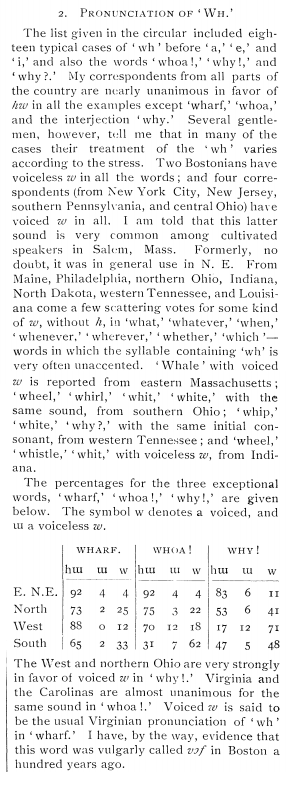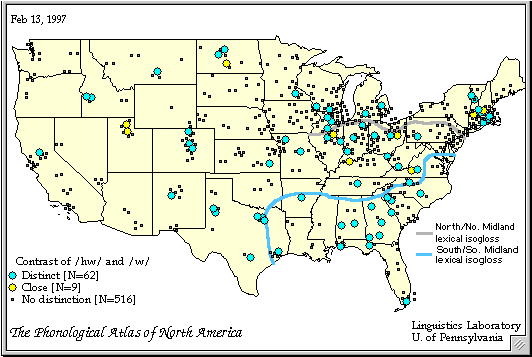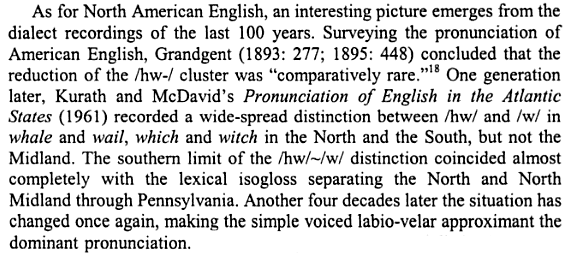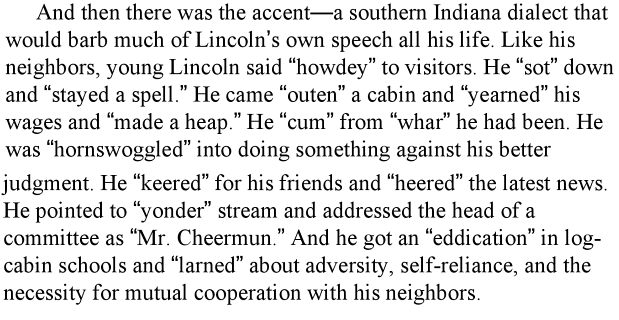Historical sociolinguistics in the movies
« previous post | next post »
From reader JM:
My son Chris (age 26) e-mailed me to ask which was correct: “younger than me” or “younger than I”. He had been watching “The Patriot” (the movie with Mel Gibson), and noted the use of “younger than I.” I assume that this would have been the standard in the late 1700s. When he and I saw the movie “Lincoln” last weekend, I noted that Daniel Day Lewis pronounced what and which, etc. as [hw]. I gather (from Wikipedia, etc.) that the more common pronunciation in both the U.S. and the U.K. is now [w], but couldn’t find anything about the time course of this merger. Is it known for sure that Lincoln said [hw]? Just curious….don’t know anything about how much effort film directors put into this kind of historical accuracy.
The discussion of than in MWDEU suggests that 18th-century usage of "than I" or "than me" would have been a coin flip. As far as I know, there's been no empirical work on how that coin was biased over time (and space, and register, and social stratum) — this would be a good term project in a linguistics course, and maybe even a good thesis topic.
With respect to Lincoln's use of [hw] or [w], there's a survey of relevant evidence in Donca Minkova, "Philology, linguistics, and the history of [hw]~[w]", and Lesley Milroy, "An essay in historical sociolinguistics?: On Donka Minkova's 'Philology, linguistics, and the history of [hw]~[w]'", in Anne Curzan and Kimberly Emmons, Studies In The History Of the English Language II: Unfolding Conversations, 2004.
Minkova quotes Jespersen 1909 about British usage:
And she sketches the following trajectory for the U.S.:
Grandgent 1893 suggests that the change to [w] had by then produced only "a few scattering votes" from northern Ohio and Indiana — but on the other hand, self-reported intuitions about a stigmatized change-in-progress are likely to underestimate the spread of the incoming variant:

The later evidence is described by Labov et al. here:

In Kurath and McDavid's Pronunciation of English in the Atlantic States , the distinction of /hw/ and /w/ in whale and wail, which and witch was shown to be characteristic of the North and the South, but not the Midland. In fact, the southern limit of the /hw/~/w/ distinction bundled tightly with the lexical isogloss separating the North and North Midland through Pennsylvania.
Since the LAMSAS data was gathered, the distinction has rapidly eroded. Map 8 shows only 71 of 587 speakers who maintain it. In this case, "Distinct" includes all those who were heard by the analyst as pronouncing the voiceless bilabial clearly (62 cases) or not quite clearly (9) cases. There were 3 individuals who thought that the pairs were different, but made no distinction in production; they were considered to be merged.
As Stephen Oates explains in With Malice Toward None: A Life of Abraham Lincoln (1994), Lincoln's native accent was lower-class south midland:
So the evidence, as I read it, suggests that Lincoln probably would have acquired and retained the merged pronunciation apparently characteristic of the midland region (at least in a later time period) — but [hw] in his mouth is not obviously wrong either.
Some other LL posts about the authenticity historical, regional, and ethnic variation in the entertainment industry:
"True Grit isn't true", 12/29/2010
"Acting, speech, and authenticity", 8/8/2011
"'Downton Abbey' anachronisms: beyond nitpickery", 2/13/2012
(If you're confused about what [hw] means, "Hwæt about WH?", 4/13/2011, may help.)
(And PLEASE read the link before giving us your analysis and opinions about "than I" vs. "than me"…)



Ben Zimmer said,
January 1, 2013 @ 1:46 pm
And on the subject of the linguistic authenticity of Lincoln, see my Boston Globe and Word Routes columns.
Mark Liberman said,
January 1, 2013 @ 3:25 pm
I have now, less than two hours after the original post went up, deleted four (4) comments similar to the following:
When you say "he is younger than I", you are simply leaving off the verb. You mean "he IS younger than I AM" so "I" is correct, as you would not (I hope) say, "he is younger than me am"!
PLEASE (as requested in the original post) read MWDEU's entry on than before adding your mite to the pile of deleted comments along these lines.
If you have something to add to what William Ward had to say on the subject in 1765, along with the rest of the discussion in MWDEU, the rest of us will be happy to read it. If you can't be bothered to do anything besides give vent to your knee-jerk response, you should go impose it on a friend, or post it on your own web log, because it won't be appearing here.
Charles Wells said,
January 1, 2013 @ 4:27 pm
I am 75 years old and grew up in Atlanta. I lived most of my life in Cleveland Ohio and raised our two sons there. I still make the w-hw distinction and I remember my older son vacillating between the two when he was about five. When he used the fricative he made it quite emphatic. I suspect my accent was confusing him. I notice that in the Lincoln movie he also said "idn't" and "wadn't". My brother, who stayed in Atlanta, never abandoned those pronunciations, but I stopped using them a long time ago, except sometimes when I am tired.
Ø said,
January 1, 2013 @ 4:41 pm
I once heard a man say to his child "He is bigger than you are big." I always wondered why. Something like hypercorrection?
John Walden said,
January 1, 2013 @ 6:20 pm
Does voiced w have to be /hw/? Can't it be /wh/?
By which I mean pronouncing "when" as "oo hen" and not "hoo oo en" (said quickly, of course)
Lazar said,
January 1, 2013 @ 7:24 pm
Transcribers seem to disagree whether it should be considered as a sequence of two sounds (which I've usually seen as [hw], not [wh]) or as a single fricative or "voiceless approximant", [ʍ]. I've never been able to figure out whether there's a meaningful or audible distinction to be made between [hw] and [ʍ] within English, but Grandgent seems to think that there is.
Dw said,
January 2, 2013 @ 2:03 am
@John Walden,
Some Indian English speakers, especially those whose native language is Marathi, use a spelling pronunciation [ʋʱ] in English "wh-" words (/ʋʱ/ is a phoneme of Marathi).
As for [hw] versus [ʍ]: if we are to take the IPA literally then the former is theoretically a sequence of two phones (with voicing turned on at the transition), while the latter is a single co-articulated phone, voiceless throughout.
JFM said,
January 2, 2013 @ 5:08 am
Not much to add, but Henry Fonda used a very clear [hw] pronunciation in the movies I recall seeing. I have no idea if that was his native speech or a deliberate actorese.
According to Wikipedia, he was born in Nebraska.
RRK said,
January 2, 2013 @ 11:42 am
I just noticed this morning, incidentally, that the guy who reads funding announcements on NPR has the [hw] pronunciation. I couldn't find where he grew up, and his resume spans the country, but he spent significant time in Illinois and got his PhD in communication in Texas, FWIW.
This pronunciation also brings to mind Dave Chappelle's impression of the rapper Lil' Jon; see, e.g., http://on.cc.com/vZWQO9. But I think his comically exaggerated [hw] ("what" comes out as "hoooooo-ut") is purely a comedic creation and doesn't reflect anything about Lil' Jon or his regional dialect, especially since LJ himself does not noticeably say "what" in the song "Yeah!", which is the source material for the impression.
Jerry Friedman said,
January 2, 2013 @ 5:38 pm
I wonder what pronunciation Stephen Oates or his sources meant by "cum". The Century Dictionary—the first edition, of 1889, as far as I can tell—gives the pronunciation of "come" as "kum". Were people transcribing Lincoln's speech using "cum" as eye dialect (in the original sense of a non-standard spelling of a standard pronunciation), or was some other pronunciation of "come" really standard in America at the time?
I was going to get all indignant about the idea that the North had the which/witch distinction in the '60s, because I certainly don't remember it from when I was growing up in Cleveland, except from a few teachers and black kids. Then I got to the part where northern Ohio was an exception. I see I'm agreeing with Charles Wells.
Ben said,
January 2, 2013 @ 10:01 pm
@Jerry Friedman:
Oates means that Lincoln would have said "come" where you or I would say "came", I believe. (I've heard my grandfather do this, in fact).
Cy said,
January 3, 2013 @ 3:12 pm
Regardless of how linguistically accurate DDL's Lincoln is, I have to say, as someone whose family hails from (collectively) the same regions that Lincoln was born in, practiced law in, and lived in, Lewis did an amazing job for a non-linguist in getting the pronunciation and verbage dead-on (at least for speakers from the last hundred years). There are things my family says that it took me years to formally acknowledge, when I could have just waited for this movie to notice them.
@Jerry Friedman My relatives still do this – it's a little like some AAVE forms of "be" vs. "is," in using "came" very rarely (perfective? progressive? not sure), but "come" as the regular preterite. My wife, from Southeast Asia, routinely uses the phrase "come to find out" now in all her presentations, which I have no proof is related, but is from the same people.
mollymooly said,
January 3, 2013 @ 5:10 pm
I can divide WH words into three groups…
– (1) words I learnt from other Irish people (when, white, whiskey,…)
– (2) words I learnt from TV (whoops, whoopee, whoa, marijuana,…)
– (3) words I learnt from books (whelp, whortleberry, Hwang-Ho, San Juan,…)
…based on the fact that I have [hw] in class (1) and (3) and [w] in class (2). I also distinguish a "science whiz" (who learns science fast) from a "science wiz" (who does science preternaturally well).
Dw said,
January 3, 2013 @ 6:04 pm
@mollymooly
The people on TV didn't have Irish accents?
mollymooly said,
January 4, 2013 @ 4:44 pm
@Dw: well, let me change (2) to "words I learnt from imported TV". Most fiction and a good deal of factual content shown on RTÉ is and was produced in the US or UK.
Alex said,
January 7, 2013 @ 9:52 am
Speaking of the accuracy of fictional portrayals of [wh]/[w], I've often remarked in British books a mocking transcription of pompous (and usually female) characters' speech as marked by an overabundance of [wh], even in words where it is not appropriate (e.g. "whater" for "water"). It's kind of like the hypercorrective addition of [h] to words when a speaker who would normally drop initial [h]s adds them to words that really do start with vowels.
Does this substitution of [wh] for [w] really occur in hypercorrected speech, or are authors overgeneralizing their impressions of there being an awful lot of [wh] in the speech of ladies who were at the kind of school Jespersen refers to?
Devilbunny said,
January 10, 2013 @ 9:37 pm
I'm a native Mississippian, late 30s, and I distinguish the two (though even here I'd say most don't). College friends from the Northeast had never heard anyone do that outside of movies.
Plane said,
November 18, 2013 @ 12:48 pm
The links to MWDEU don't work anymore, unfortunately.